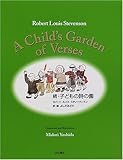(600) Vinegar Valentines [詩歌]
2) Victorian era: <英> ビクトリア朝[時代] ◆ビクトリア女王の即位(1837)からその死(1901年)までの、イギリスが最も繁栄した時代を指す。
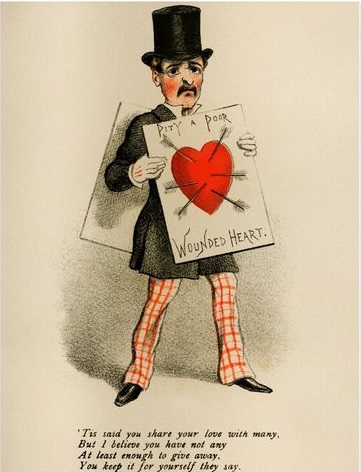
WOUNDED HEART
But I believe you have not any
At least4) enough to give away.
You keep it for yourself they say.
4) at least: 少なくとも
傷ついた心を哀れむ
しかし、私はあなたが何も持っていないと信じている
少なくとも与えるだけの十分なものはありません。
あなたは自分のためにその愛を独り占めしていると人は噂する
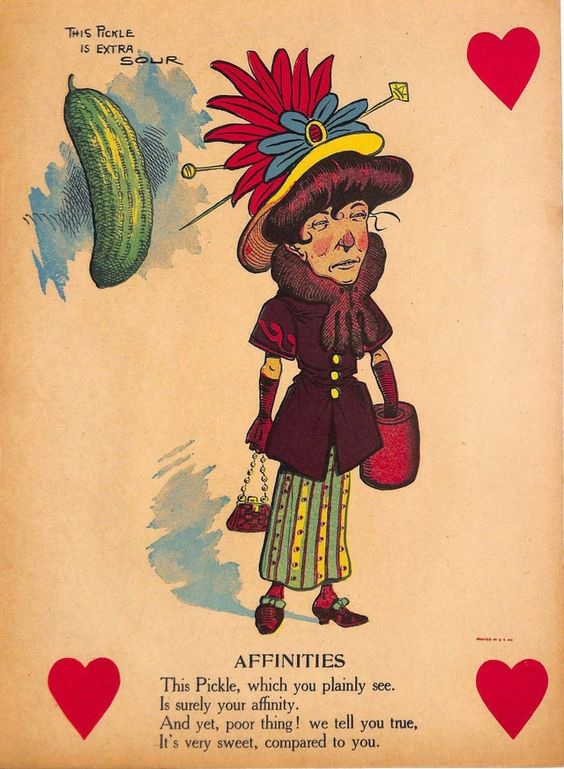
This PICKLE is EXTRA SOUR
AFFINITIES5)
Is surely your affinity.
And yet, poor thing! We tell you true.
It's very sweet, compared to6) you.
6) compared to: 比べると;くらべて;のに対して;比較すると;比べて
似た物同士
きっとあなたとよく似ている、
それなのに、かわいそうなことに!本当のことを言いますが、
とても甘いよ、あなたに比べたら。

Wolf
All decked out7) in suits and ties
That nearly scream aloud
You flash a lady-killing smile
And think you have 'em wowed!
To every gal you see
But you're really just a two-bit8) chump9)
As corny as can be!
8) two-bit: 《俗語》安っぽい、くだらない
9) chump: ばか、まぬけ、だまされやすい人
大声で叫びそうになる
女殺しの笑みを浮かべる君
そして、女たちを魅了したつもりになる!
君が見るすべてのギャルに
でも、本当はただのチンピラなんだ
お下劣極まりない!
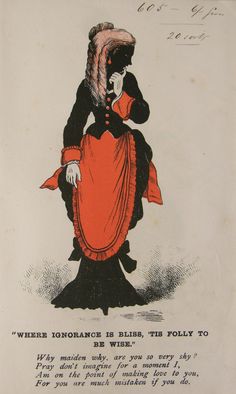
"WHERE IGNORANCE IS BLISS10), 'TIS FOLLY11) TO BE WISE"
Pray don't imagine for a moment I,
Am on the point of making love to you,
For you are much mistaken12) if you do.
10) bliss: 無常の喜び、至福
11) folly: [fάli] 愚かさ、愚劣
12) you are much mistaken: あなたはとんでもなく間違っている
どうか、一瞬でも思わないで
私があなたと、まさに愛し合おうとしているなどと
なぜって、あなたがそう思っているなら、まったくの誤解です
(598) 命口腹心気 [詩歌]

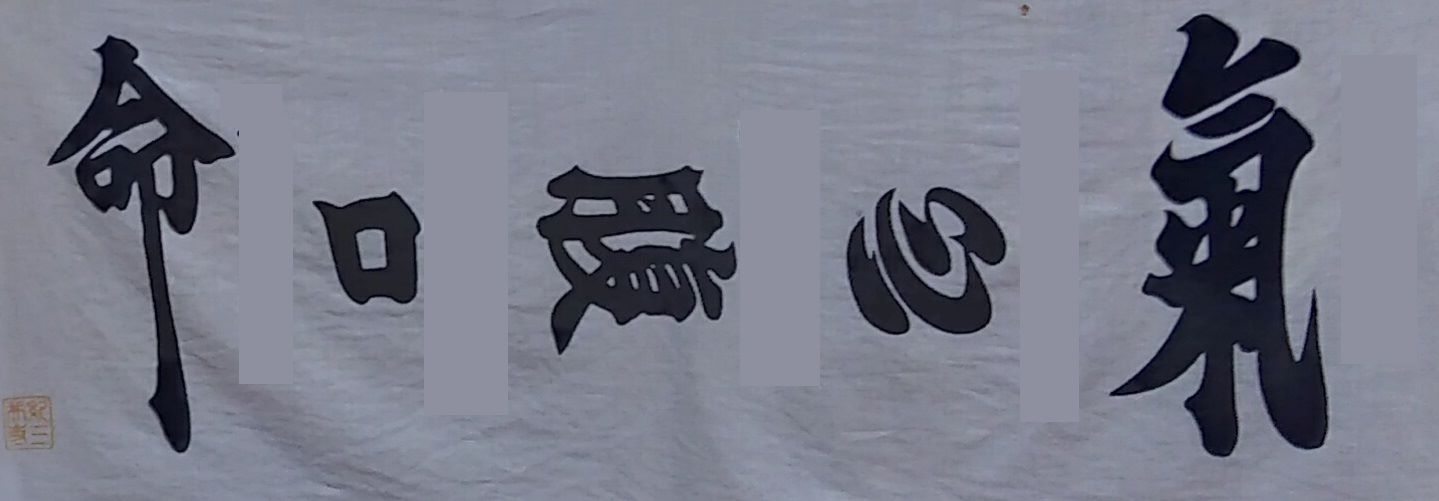
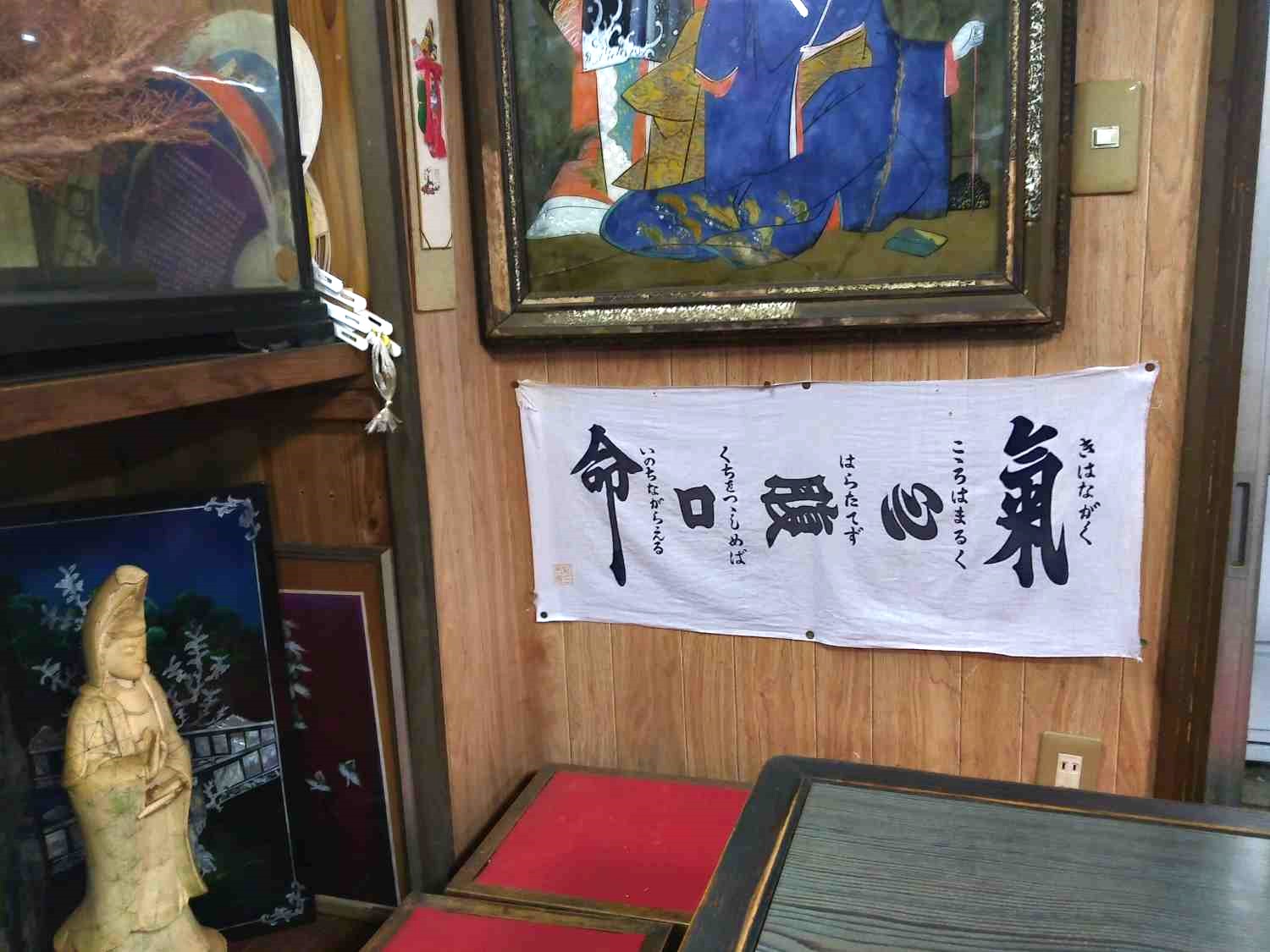
(573) Don't let it rain. [詩歌]
雨が降りそうな天気。
まだ降っては無かったが、用心のため雨合羽は持っていった。
雨よ、降らないでくれ!と願った。
でも、途中ポツポツと振り始めた。
家にもどってから、Google翻訳で訳すと
Don't let the rain fall.
と出た。次にDeepL翻訳で確かめると
Don't let it rain.
と答えてくれた。
実際にどう使われているのか確かめるため、ネットで検索すると、YouTubeで歌を見つけた。

Jeanette, Spanish singer, 1978: "No digas buenas noches/ Heaven, please, don't let it rain tonight"
|
Heaven, please, don't let it rain tonight You and I And tonight So, I say: You and I Jus the sea Heaven, please don't let it rain tonight. Heaven, please don't let it rain tonight. Heaven, please don't let it ain tonight. |
神さま、今夜は雨を降らさないでください あなたと私さよならを言わなければならない、夜明けに、全てが一度に始まった海辺で。 そして今夜 だから、私は言う あなたと私 ただ、海が見ている、あなたが私をそっと愛してくれるのを。忘れられてしまうでしょうけど、私は覚えている。 神さま、どうぞ今夜は雨を降らさないでください。月が輝きますように。 神さま、お願いです、今夜は雨を降らさないでください。 神さま、お願いです、今夜は雨を降らさないでください。私の祈りを聞いてください。 |
(562) 鶯宿梅 Oushukubai [詩歌]
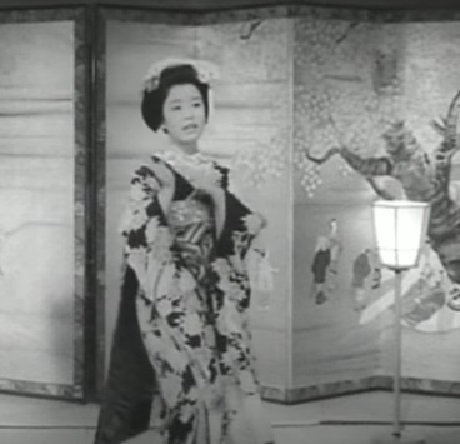
My favorite one is Misora Hibari's dancing scene in a samurai movie. She was dancing in kimono and singing to the shamisen, a banjo-like instrument with three strings. She sang that she is uguisu the Japanese nightingale, the one she loves is the plum tree. I couldn't understand love between a nightingale and a plum tree. I am a little confused because I imagined several nightingales in a plum tree. The expression 鶯宿梅(oushukubai) nightingale's-home-plum tree was quite new to me. But the other day I learned a famous old waka poem and its anecdote.
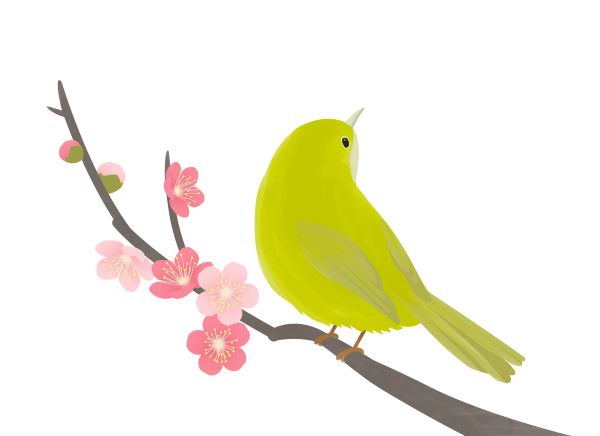
(The emperor had a red-blossoming plum tree very dear to him. It died, and his minister was sent to seek and get a tree like it. At last, one was found and asked of the lady who owned it. She loved the plum tree for its blooms, and because a nightingale would come there and sing; but she could not deny since it was the order of the emperor. When the tree was taken away, she tied to it a little paper, upon which was written:
Uguisu no Yado wato towaba 鶯の宿はと問わば
Ikaga kota yen. いかが答へむ
”As it is the order of the emperor, I am filled with awe; but if am asked where is the home of the nightingale, what shall I answer?" The emperor, touched by the verse, returned the plum tree.)
ーTwenty Months in Japan by H. G. Hawkinsー
This incident happened more than 1,000 years ago in Kyoto in Japan. This plum tree is called oushukubai, which means Japanese nightingale's-home tree.
Harusame ni shippori nururu Uguisuno
Ha-kaze ni Niou Ume ga Ka ya
Hana ni tawamure shiorashiya
Kotori de saemo Hitosuji ni
Negura sadamenu Ki wa hitotsu
Watasha Uguisu Nushi wa Ume
Yagate mimama kimama ni narunaraba
Saa Oushuku Bai ja naikai naa
Saasa nan demo yoiwai naa
A Japanese nightingale gets wet moistly in the spring rain
The fragrance of plum blossoms wafting fragrantly in the breeze of feathers
The lovely nightingale playing in the plum blossoms
Even such a fragile little bird
Has its roost firmly set
And lives in the plum tree sincerely
Someday I will be free
If I am free to do as I please
Then I'll fly to you, my home of the plum tree
Oh, it doesn't matter anymore
Oh, I don't care anymore
*
(553) Ame nimo makezu [詩歌]
https://www.youtube.com/watch?v=0XUB3uSMRrY

Minister Mandai sang this song at Matsuyama Citizen Charity Xmas. I was instantly fascinated by this song. The lyrics are so famous that all of us know of the beginning of it, "Ame nimo makezu, kaze nimo makezu." It was Miyazawa Kenji's poem. I wanted to get a CD of this song. But Minister Mandai said there was not CDs of the song. I searched for this song on the internet and found a singer, Usamoto Kyoichi put this melody to the relics in 2007.
雨ニモマケズ
風ニモマケズ
雪ニモ夏ノ暑サニモマケヌ
丈夫ナカラダヲモチ
慾ハナク
決シテ嗔ラズ
イツモシヅカ二ワラッテヰル
一日二玄米四合ト
味噌ト少シノ野菜ヲタベ
アラユルコトヲ
ジブンヲカンジョウニ入レズ二
ヨクミキキシワカリ
ソシテワスレズ
野原ノ松ノ林ノ蔭ノ
小サナ萱ブキノ小屋二ヰテ
東二病気ノコドモアレバ
行ッテ看病シテヤリ
西二ツカレタ母アレバ
行ッテソノ稲ノ朿ヲ負ヒ
南二死二サウナ人アレバ
行ッテコワガラナクテモイヽトイヒ
北ニケンクヮヤソショウガアレバ
ツマラナイカラヤメロトイヒ
ヒドリノトキハナミダヲナガシ
サムサノナツハオロオロアルキ
ミンナニデクノボートヨバレ
ホメラレモセズ
クニモサレズ
サウイフモノニ
ワタシハナリタイ

MIYAZAWA KINGI 宮沢賢治
Unbeaten by rain
Unbeaten by wind
Unbowed by the snow and the summer heat
Strong in body
Free from greed
Without any anger
Always serene
With a handful of brown rice a day
Miso and a small amount of vegetables suffice
Whatever happens
Consider yourself last, always put others first
Understand from your observation and experience
Never lose sight of these things
In the shadows of the pine groves in the fields
Live modestly under a thatched roof
In the East, if there is a sick child
Go there and take care of him
In the West, if there is an exhausted mother
Go there and relieve her of her burden
In the South, if there is a man near death
Go there and comfort him, tell him "Don't be afraid"
In the North, if there is an argument and a legal dispute
Go there and persuade them it's not worth it
In a drought, shed tears
In a cold summer, carry on
Even with a sense of loss
Being called a fool
Being neither praised nor a burden
Such a person I want to be
Translation Copyright![]() 2011 by Catherine Iwata, Fredrich Ulrich, Orlagh O'Reilly, Helen Bartos, Minaeri Park, Mokmi Park, Helen Bartos, Sophie Sampson, Kotomi Okbo, Eva Tuunanen, Alessanra Lauria, Sophie Sampson, Miwa Block, Nancy O'Reilly, Jasmina Vico & Yasuko Akiyama
2011 by Catherine Iwata, Fredrich Ulrich, Orlagh O'Reilly, Helen Bartos, Minaeri Park, Mokmi Park, Helen Bartos, Sophie Sampson, Kotomi Okbo, Eva Tuunanen, Alessanra Lauria, Sophie Sampson, Miwa Block, Nancy O'Reilly, Jasmina Vico & Yasuko Akiyama
・慾ハナクFree from greed
greed: the feeling that you want more of something than you need
・イツモシヅカ二ワラッテヰルAlways serene
serene: very calm and peaceful
・一日二玄米四合トWith a handful of brown rice a day
四合ノコメ:現代では一日の量としては多すぎる。食べ過ぎの気がする。
handful: the amount that you can hold in your hand
・味噌ト少シノ野菜ヲタベMiso and a small amount of vegetables suffice
suffice: be sufficient
・ツマラナイカラヤメロトイヒGo there and persuade them it's not worth it
worth: having a certain value. This ring is worth a lot of money.
・ヒドリノトキハナミダヲナガシIn a drought, shed tears
ヒドリ:(日取り)じゃなくてヒデリ(日照り)と解釈している。
・サムサノナツハオロオロアルキIn a cold summer, carry on
Even with a sense of loss
carry on: to continue doing something
*
(507) In this town この街で [詩歌]

(496) The Flowers [詩歌]
この詩の中にでてくる、7つの草花について調べました。特に最初の5つの名前がとても面白いので、見てください。妖精の絵も探してみました。
All the names I know from nurse:
Gardener’s garters 1), Shepherd’s purse 2),
Bachelor’s buttons 3), Lady’s smock 4),
And the Lady Hollyhock 5).
Fairy places, fairy things,
Fairy woods where the wild bee wings,
Tiny trees for tiny dames
These must all be fairy names!
Tiny woods below whose boughs
Shady fairies weave a house;
Tiny tree-tops, rose 6) or thyme 7),
Where the braver fairies climb!
Fair are grown-up people’s trees,
But the fairest woods are these;
Where if I were not so tall,
I should live for good and all.
Stevenson, Robert Louis (1850-1894). A Child’s Garden of Verses and Underwoods. 1913.
訳・絵 よしだみどり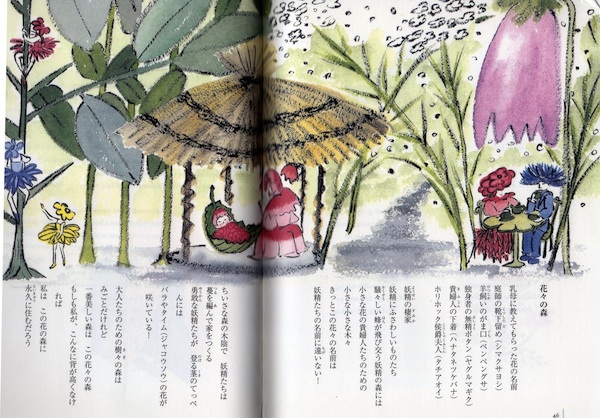
1) Gardener’s garters,
(庭師の靴下留め: よしだみどり訳)
(シマクサヨシRibbon Grass, Reed Canary Grass, Gardener's Garters)
gardeners' garters (uncountable)
ribbongrass
https://davesgarden.com/guides/pf/showimage/4383/
.jpg)
19th century
Some women wore stockings with a plain elastic garter or narrow material tied tightly, not suspenders, or by simply rolling the top of the stocking, because it seemed more practical or they could not afford classic corsetry, thus creating a kind of predecessor of the modern hold ups.

https://en.wikipedia.org/wiki/Hold-ups
Hold-ups or stay-ups (in the United States also referred to as thigh-high stockings or simply thigh highs) are stockings with an elasticized band at the top, designed to hold the stockings up when worn, without the use of a garter belt or garters. Thigh highs are held up by one or more bands sewn to the top that is backed with silicone on its inner surface. This ensures the thigh highs stay in position because of the elastic and the friction of the silicone against the skin. The silicone can become ineffective by contact with body lotions, oils and talcum powder1), as they all reduce the friction of the silicone. Thigh highs are designed so that the elastic band exerts just the right pressure on a woman's thigh, avoiding any uncomfortable tightness or unflattering2) muffin-top3) effect. Sometimes thigh highs are preferred to pantyhose for hygiene reasons, because they reduce excessive microbial growth around the groin4) due to humidity and warmth.
1) talcum powder:タルカム=パウダー(滑石粉に香料を加えた化粧用パウダー)
2) unflattering:悪印象を呈しているまたは表している(showing or representing unfavorably)
3) muffin-top:A muffin top (bulging roll of flesh)、(ズボンなどを履いたときにその上に)はみ出した肉
4) groin:又の付け根の部分
https://en.wikipedia.org/wiki/Garter
Bride putting on a garter
2) Shepherd’s purse,
よしだみどりさん訳では
「羊飼いのがま口」・・・?
口金がついてないよ「羊飼いの財布」でいいのでは?
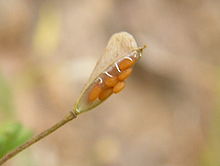
seeds in the seed pod from which it gets its name
https://en.wiktionary.org/wiki/shepherd%27s_purse
別名はペンペン草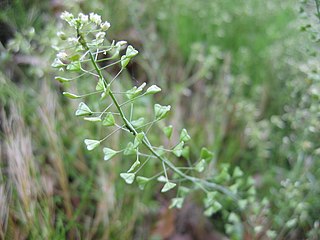
https://ja.wikipedia.org/wiki/ナズナ
3) Bachelor’s buttons, ヤグルマギク→やくるまそう cornflower
よしだみどりさん訳では「独身者の無精ボタン」
無精ボタンにしては、美しすぎるボタン?
The Bachelor Button is actually a flower that has a story behind it and this is a flower that bachelors generally wore when they had feelings for a certain person that they were trying to date. They would wear the flower and the longer that the flower lasted, the more that it showed that there was a true love there, if the flower faded away, it wasn’t meant to be.
https://www.canadianflowerdelivery.com/bachelor-button.aspx
4) Lady’s smock, ハナタネツケバナ花種漬花
よしだみどりさん訳では「貴婦人の下着」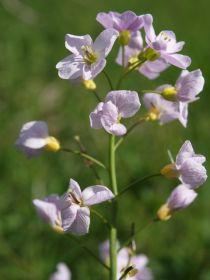
Cuckooflower ![]() Andrew Gagg/Plantlife
Andrew Gagg/Plantlife
https://www.plantlife.org.uk/uk/discover-wild-plants-nature/plant-fungi-species/cuckooflower
Whilst the name 'lady's smock1)' might refer to the pale, pinkish and slightly cupped nature of the petals, it might have another more debauched2) explanation. Similar to 'a bit of skirt', 'smock' was a slightly suggestive and rather derogatory3) term for a woman and it may be this name was applied due to the things young people got up to4) in the meadows in the spring! Paradoxically this wild flower is also associated with the Virgin.
1) smock: loose dress or protective coat
次のような使い方もあるようです。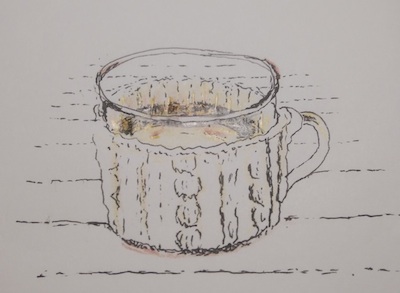
warm tea in knitted smocked mug cup
2) Debauched: dɪbɔ́ːʧt(飲酒や麻薬などで)堕落した
3) Derogatory: dɪrάgət`ɔːri|‐rˈɔgətəri, ‐tri/ (名声・人格などを)傷つけるような; 〈言葉など〉軽蔑的な。
4) got up to: <いたずらなど>をしでかす、する。
タネツケバナ種漬花/種付花
http://www.asahi-net.or.jp/~uu2n-mnt/yaso/tanken/haru/yas_tanetukebana.htm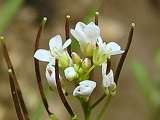
タネツケバナ(種漬花)Cardamine flexuosa
(2007年4月7日 東京都大田区・東京港野鳥公園)
アブラナ科タネツケバナ属 花期:3~6月 分布:日本全土
5) the Lady Hollyhock. タチアオイ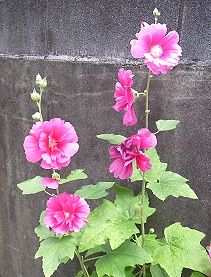
https://www.hana300.com/tachia.html
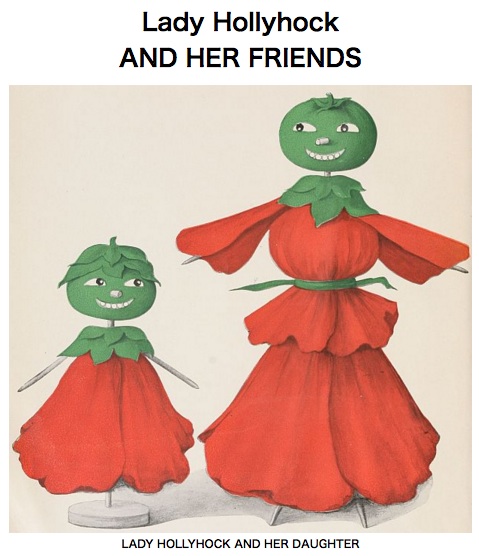
https://www.gutenberg.org/files/49616/49616-h/49616-h.htm
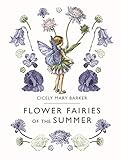
Flower Fairies of the Summer (Flower Fairies Original)
- 作者: Cicely Mary Barker
- 出版社/メーカー: Warne
- 発売日: 2018/05/31
- メディア: ハードカバー
6) rose 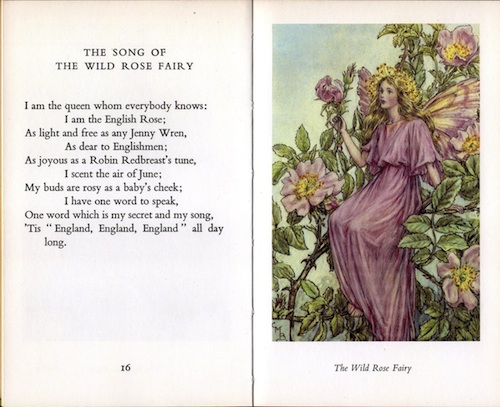
7) Thyme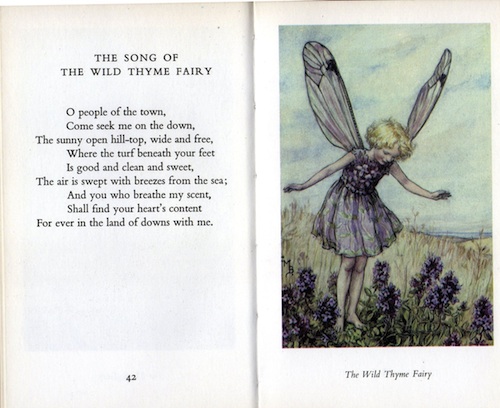
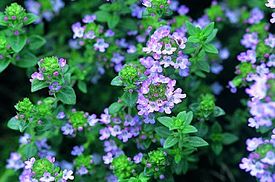
タチジャコウソウ立麝香草、コモンタイム、
https://ja.wikipedia.org/wiki/タイム_(植物)
*
(470) Nonsense with birds [詩歌]
Nonsense with birds
今年は酉年なので、鳥が出てくるナンセンス・ポエムをEdward LearのBook of Nonsenseから選んだ。
150年以上前の本で、limerickという詩の形式で書かれたナンセンス・ポエムとのことです。子供に当時は馬鹿受けだったそうです。
登場する鳥の英単語と対応する漢字を、まず列記します。
Owl 梟, hen雌鶏, lark雲雀, wren鷦, raven鴉,
There was an Old Man with a beard,
Who said, “It is just as I feared!---
Two Owls and a Hen,
Four Larks and a Wren,
Have all built their nests in my beard!”
lark: 雲雀(ひばり) songbirds
wren: 鷦 ミソサザイ small active
brown bird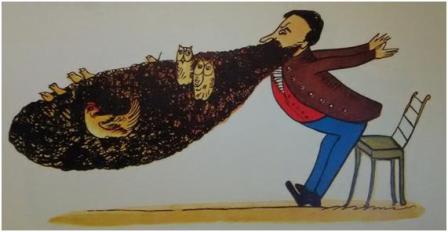
pic. EL001
There was an Old Man of Whitehaven,
Who danced a quadrille with a Raven;
But they said, “It’s absurd,
To encourage this bird!”
So they smashed that Old Man of Whitehaven.
Whitehaven: Cumbria County, North, England
quadrill: 18-19世紀に流行した、4組の男女のダンスで、スクエア・ダンスの先駆けになったもの
raven: 鴉 Large black bird with a straight bill and long wedge-shaped tail.
absurd: foolish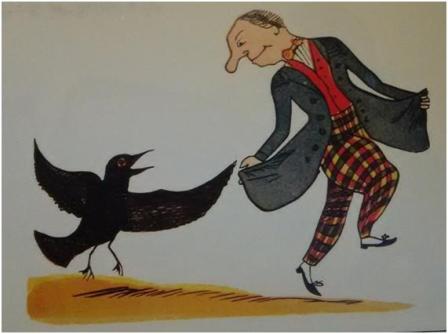
pic. EL074
There was an Old Man who said, “Hush!”
I perceive a young bird in this bush!”
When they said, “Is it small?”
He replied, “Not at all!
It is four times as big as the bush!”
hush: cause to be quiet or not talk.
perceive: to see, hear, or feel.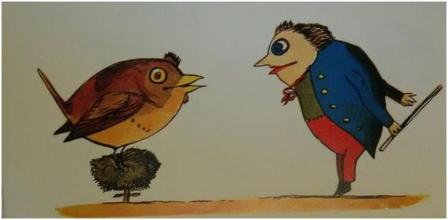
Pic. EL080
There was an Old Man with an Owl,
Who continued to bother and howl;
He sat on a rail,
And imbibed bitter ale,
Which refreshed that Old Man and his Owl.
howl: cry loudly, as of animals.
imbibe: .take in liquids
ale: an alcoholic beverage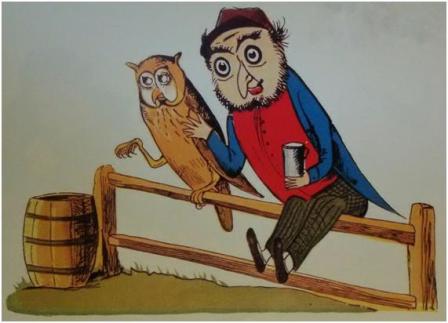
pic. EL098
There was an Old Man on whose nose,
Most birds of the air could repose;
but they all flew away,
At the closing of day,
Which relieved that Old Man and his nose.
repose: lean in a comfortable resting position.
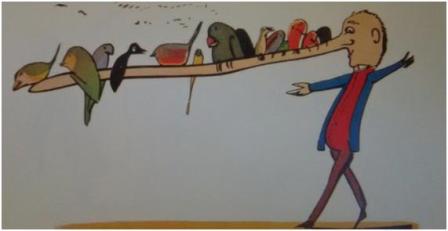
Pic. EL111
*
(429) Iroha poem [詩歌]
Hiragana is known as “Iroha poem”. It
contains every kana only once, with the exception of ん [-n], which was not distinguished from む "mu" in writing.
So it is a perfect pangram. It also plainly
explains us basic teachings of Buddhism. Iroha poem is so amazing that authorship
is traditionally ascribed to the Heian era Japanese Buddhist priest and scholar
Kūkai (空海) (774–835). However, this is unlikely according to today’s researchers. 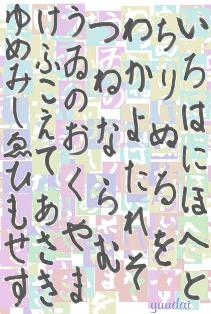
Then, what is teachings of Buddhism?
Kakuban (覚鑁/覺鑁; 1095–1143),said that the iroha poem is a transformation of these verses
in the Nirvana Sutra:
諸行無常 [Shogyō mujō] 諸行は無常なり
是生滅法 [Zeshō meppō] これ生滅の法なり
生滅滅已 [Shōmetsu metsui] 生滅を滅し已(おわ)りて
寂滅為楽 [Jakumetsu iraku] 寂滅を楽と為す
which translates into
All acts are impermanent
That's the law of creation and destruction.
When all creation and destruction are
extinguished
That ultimate stillness (nirvana) is true
bliss.
Let me say iroha poem, line by line, first,
archaic transliteration, then modern pronunciation, and lastly translation.
いろはにほへと -- 色は匂へど -- Even the blossoming flowers [Colors are fragrant, but they]
ちりぬるを -- 散りぬるを -- Will eventually scatter
わかよたれそ -- 我が世誰ぞ(Wa ga yo tare zo) -- Who in our world
つねならむ -- 常ならん -- Is unchanging?
うゐのおくやま -- 有為の奥山 -- The deep mountains of karma--
けふこえて -- 今日越えて -- We cross them today
あさきゆめみし -- 浅き夢見じ -- And we shall not have superficial dreams
ゑひもせす -- 酔ひもせず(Ei mo sezu) -- Nor be deluded.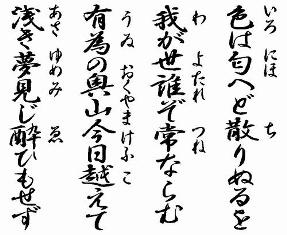
Even the blossoming flowers [Colors are
fragrant, but they] Will eventually scatter Who in our world Is unchanging? The
deep mountains of karma-- We cross them today And we shall not have superficial
dreams Nor be deluded.
*
(18)英訳百人一首の中の月 [詩歌]
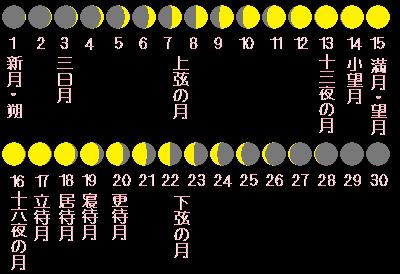
中秋の名月に因んで、月がでてくる百人一首の中から59番目の和歌の英訳を選びました。一つ目は
H. H. Honda 1957 のもので韻をふんだ4行詩、二つ目はClay MacCauley 1917は5行詩として、訳されています。ここでの月はthe setting moon と the lonely moon とそれぞれ表現されています。陰暦の16日以降だと、空に月が残ったままで夜が明けて、夜明けの月、有明の月となってしまうから、この和歌の月はそれ以前の月となるのかな。
百人一首(59)
赤染衛門
やすらはで
ねなましものを
さ夜ふけて
かたぶくまでの
月をみしかな
―The Lady Akazome Emon
Alas, if only I had known
That you could be so false to me,
I'd not leave sat up all alone
In vain the setting moon to see
translation by H. H. Honda 1957
ONE HUNDRED POEMS FROM ONE HUNDRED POETS
THE HOKUSEIDO PRESS 英訳小倉百人一首 (1956年)
Akazome Emon
Better to have slept
Care-free, than to keep vain watch
Through the passing night,
Till I saw the lonely moon.
Traverse her descending path
translation by Clay MacCauley 1917
SINGLE SONGS OF A HUNDRED POETS
http://etext.virginia.edu/japanese/hyakunin/macauley.html
ご参考1:
新月(朔): しんげつ(さく)
三日月: みかづき
上弦の月: じょうげんのつき
十三夜の月:じゅうさんやのつき
小望月: こもちづき
満月(望月): まんげつ(もちづき)
十六夜の月: いざよいのつき
立ち待ち月: たちまちづき
居待ち月: いまちづき
寝待ち月: ねまちづき
更待ち月: ふけまちづき
下弦の月: かげんのつき
ご参考2:
H. H. Honda
もと東大の英文字教授をしていたと聞くH. H. Hondaは『新古今集』や、西行の『山家集』の全訳をやった人だが、四行で韻を踏ませたその訳はdoggerelとして、アメリカの日本文学界では文献目録にすら無視されることが多い。
( 佐藤紘彰, translator of Japanese poetry, さんの「短歌の英訳」より )
doggerel :verse that is loosely styled especially for comic effect

